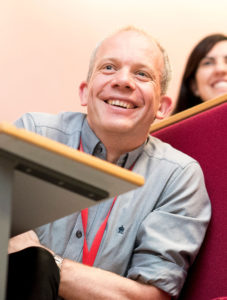We are delighted to announce the winner of the 2018 Hooke Medal is…
Andrew McAinsh
Following a PhD at the University of Cambridge with Steve Jackson (1997-2001), Andrew moved to the Massachusetts Institute of Technology, USA to train with Peter Sorger. Here, as a Jane Coffin Childs Fellow, his enthusiasm for kinetochore biology was ignited. He returned to the UK in 2005 to establish his independent laboratory at the Marie Curie Research Institute, before moving to the University of Warwick in 2009 to co-found the Centre for Mechanochemical Cell Biology (CMCB). In 2014 he was appointed Professor of Cell Biology and became a Wellcome Senior Investigator. He was then awarded a Royal Society Wolfson Research Merit Award for his work on chromosome segregation in 2015. He co-directs the MRC Doctoral Training Partnership in Interdisciplinary Biomedical Research, and this year, became Head of Division of Biomedical Sciences at Warwick Medical School. Andrew’s laboratory has made important contributions to understanding how human cells ensure error-free chromosome segregation using a combination of live-cell quantitative microscopy, in vitro reconstitution and computational methods. Most recently he has revealed novel features of the kinetochore – the multi-protein assemblies that physically connect chromosomes to microtubules. Visit Andrew’s website for more information on his research.
You can watch Andrew’s medal lecture on the BSCB YouTube channel here.
What is the Hooke medal?
The Hooke Medal is awarded every year by the BSCB and recognises an emerging leader in cell biology. The award is named after Robert Hooke, the eminent 17th century natural philosopher and author of Micrographia (the world’s first comprehensive illustrated book on microscopy) and is given to an individual who has made an outstanding contribution to UK Cell Biology – until we extended the period of eligibility in May 2014 this has usually been within the first 10 years of establishing their own lab. The medal is presented annually at the annual Spring Meeting after which the winner delivers their research talk.
The medal shows Robert Hooke’s microscope and the cork cells he first described. It was designed by Dr Brad Amos.
Since 2015, the Hooke Medal has been awarded to a cell biologist who started their own group within the last 14 years (with allowances for legitimate career breaks).

